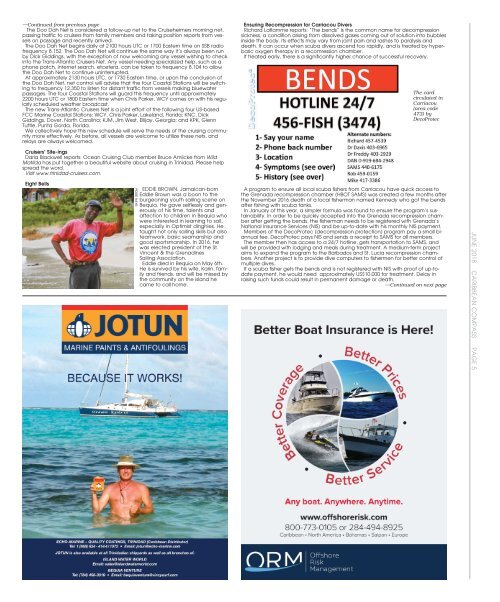Caribbean Compass Yachting Magazine - June 2018
Welcome to Caribbean Compass, the most widely-read boating publication in the Caribbean! THE MOST NEWS YOU CAN USE - feature articles on cruising destinations, regattas, environment, events...
Welcome to Caribbean Compass, the most widely-read boating publication in the Caribbean! THE MOST NEWS YOU CAN USE - feature articles on cruising destinations, regattas, environment, events...
Create successful ePaper yourself
Turn your PDF publications into a flip-book with our unique Google optimized e-Paper software.
— Continued from previous page<br />
The Doo Dah Net is considered a follow-up net to the Cruiseheimers morning net,<br />
passing traffic to cruisers from family members and taking position reports from vessels<br />
on passage and recently arrived.<br />
The Doo Dah Net begins daily at 2100 hours UTC or 1700 Eastern time on SSB radio<br />
frequency 8.152. The Doo Dah Net will continue the same way it’s always been run<br />
by Dick Giddings, with the exception of now welcoming any vessel wishing to check<br />
into the Trans-Atlantic Cruisers Net. Any vessel needing specialized help, such as a<br />
phone patch, internet search, etcetera, can be taken to frequency 8.104 to allow<br />
the Doo Dah Net to continue uninterrupted.<br />
At approximately 2130 hours UTC, or 1730 Eastern time, or upon the conclusion of<br />
the Doo Dah Net, net control will advise that the four Coastal Stations will be switching<br />
to frequency 12.350 to listen for distant traffic from vessels making bluewater<br />
passages. The four Coastal Stations will guard this frequency until approximately<br />
2200 hours UTC or 1800 Eastern time when Chris Parker, WCY comes on with his regularly<br />
scheduled weather broadcast.<br />
The new Trans-Atlantic Cruisers Net is a joint effort of the following four US-based<br />
FCC Marine Coastal Stations: WCY, Chris Parker, Lakeland, Florida; KNC, Dick<br />
Giddings, Dover, North Carolina; KJM, Jim West, Ellijay, Georgia; and KPK, Glenn<br />
Tuttle, Punta Gorda, Florida.<br />
We collectively hope this new schedule will serve the needs of the cruising community<br />
more effectively. As before, all vessels are welcome to utilize these nets, and<br />
relays are always welcomed.<br />
Ensuring Recompression for Carriacou Divers<br />
Richard Laflamme reports: “The bends” is the common name for decompression<br />
sickness, a condition arising from dissolved gases coming out of solution into bubbles<br />
inside the body. its effects may vary from joint pain and rashes to paralysis and<br />
death. It can occur when scuba divers ascend too rapidly, and is treated by hyperbaric<br />
oxygen therapy in a recomression chamber.<br />
If treated early, there is a significantly higher chance of successful recovery.<br />
The card<br />
circulated in<br />
Carriacou<br />
(area code<br />
473) by<br />
DecoProtec<br />
Cruisers’ Site-ings<br />
Daria Blackwell reports: Ocean Cruising Club member Bruce Amlicke from Wild<br />
Matilda has put together a beautiful website about cruising in Trinidad. Please help<br />
spread the word.<br />
Visit www.trinidad-cruisers.com.<br />
Eight Bells<br />
ROSE KAYE<br />
EDDIE BROWN. Jamaican-born<br />
Eddie Brown was a boon to the<br />
burgeoning youth sailing scene on<br />
Bequia. He gave selflessly and generously<br />
of his time, talents and<br />
affection to children in Bequia who<br />
were interested in learning to sail,<br />
especially in Optimist dinghies. He<br />
taught not only sailing skills but also<br />
teamwork, basic seamanship and<br />
good sportsmanship. In 2016, he<br />
was elected president of the St.<br />
Vincent & the Grenadines<br />
Sailing Association.<br />
Eddie died in Bequia on May 6th.<br />
He is survived by his wife, Karin, family<br />
and friends, and will be missed by<br />
the community on the island he<br />
came to call home.<br />
A program to ensure all local scuba fishers from Carriacou have quick access to<br />
the Grenada recompression chamber (HBOT SAMS) was created a few months after<br />
the November 2016 death of a local fisherman named Kennedy who got the bends<br />
after fishing with scuba tanks.<br />
In January of this year, a simpler formula was found to ensure the program’s sustainability.<br />
In order to be quickly accepted into the Grenada recompression chamber<br />
after getting the bends, the fisherman needs to be registered with Grenada’s<br />
National Insurance Services (NIS) and be up-to-date with his monthly NIS payment.<br />
Members of the DecoProtec (decompression protection) program pay a small biannual<br />
fee. DecoProtec pays NIS and sends a receipt to SAMS for all members.<br />
The member then has access to a 24/7 hotline, gets transportation to SAMS, and<br />
will be provided with lodging and meals during treatment. A medium-term project<br />
aims to expand the program to the Barbados and St. Lucia recompression chambers.<br />
Another project is to provide dive computers to fishermen for better control of<br />
multiple dives.<br />
If a scuba fisher gets the bends and is not registered with NIS with proof of up-todate<br />
payment, he would need approximately US$10,000 for treatment. Delay in<br />
raising such funds could result in permanent damage or death.<br />
—Continued on next page<br />
JUNE <strong>2018</strong> CARIBBEAN COMPASS PAGE 5


















